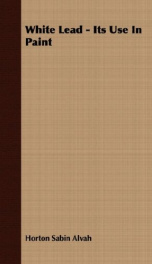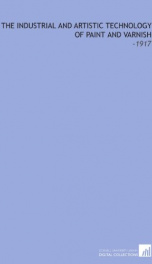white lead its use in paint

MATERIALS, THE PAINT AND VARNISH SOCIETY LONDON, ETC. LECTURER IN NEW YORK UNIVERSITY TOTAL ISSUE, FOUR THOUSAND NEW YORK JOHN WILEY SONS, INC. LONDON CHAPMAN HALL, LIMITED 1920 PREFACE As far back as we have written language we find mention of lead. Its most common ore, galena, which is brilliantly crystalline and about as heavy as metallic iron, is found in almost all parts of the world the readi ness with which the metal may be obtained from it is shown by the fact that the early settlers in this country used to set fire to a fallen hollow log and put some of the ore in the burning concavity, in the bottom of which enough melted lead would accumulate to fur nish them with material for bullets while the Indians made a fire over a bowl-shaped hole in the ground and by putting the lead-ore on iv Preface the fire they secured lumps of metal from the hole under the fire-place, to sell to the traders as it is about half as heavy again as iron, and may easily be cast or beaten into almost any form, it is not surprising that it should have been known to the ancient races of men. It is spoken of in the book of Genesis, and in the book of Ezekiel it is noted that fire will burn it to dross, which is litharge and various uses of it are men tioned in the Old Testament. The Assyrians used it, as we do now, to secure iron bolts in holes drilled in rocks and building-stones the Greeks, and probably many other nations of antiquity, were acquainted with white-lead and red-lead. The Romans used lead-pipe for city water-works, and understood not only soldering, but the more difficult art of lead-burning, which consists in fusing to gether two adjacent edges of sheet-lead with a blowpipe and in the middle ages, sheet Preface v lead was frequently used, as it is somewhat rarely now, for roofing material. From that time to the present, the increase in the variety of uses for this metal has merely been such as has taken place with use of materials of all sorts, as civilization and knowledge have progressed. It is now used in antifriction metals as packing for pipe-joints stained glass in windows is bound together with leaden kames lead wire makes fuses for electric light wiring it is a necessary ingredi ent in rubber wares, and in enamels and vitreous glazes type-metal contains it, and storage-batteries young men use it to weight the lines for catching fish, and ladies use similar weights in the hem of their skirts to give them an attractive appearance, and in all cases it gives satisfactory results but the largest single use is in white-and red-lead for paint. vi Preface In the Prologue to the Canterbury Tales, written about 1386, Chaucer enumerates among standard medicinal drugs quicksilver, litharge, brimstone, ceruse i. e., white-lead, and borax, which is the earliest English men tion of lead compounds for this purpose that has come to the writers notice. About 1525 the celebrated physician, Paracelsus, who first systematically used chemistry in medi cine, speaks of white-lead, litharge and red lead as well-known and necessary medicines, and in 1585 a medical treatise by Lloyd says that white-lead dropped into the eyes takes away the pain and clears the eyes. But in general it is spoken of as paint and paint does not appear to have been used as a pre servative, as we use it now, but primarily for decoration and especially as a cosmetic. From this latter use comes the implied mean ing of deception thus Chaucer, in the Par sons Tale Paint thy confession by fair Preface vii words to cover thy sin, and in 1456 Sir G. Haye This story is painted in many places in 1519, Herman They white their face and neck with ceruse in 1599, Chapman says She is very fair, I think she be painted and Hcxham To paint ones face as gentlewomen do and Fletcher in 1622 I dare tell you To your new cerused face, what I have spoken Freely behind your back...
Info about the book
Author:
Series:
Unknown
ISBN:
0273652419
Rating:
4.5/5 (3)Your rating:
0/5
Languge:
English
Users who have this book
Users who want this book
What readers are saying
What do you think? Write your own comment on this book!
write a commentGenre
if you like white lead its use in paint try:
Do you want to read a book that interests you? It’s EASY!
Create an account and send a request for reading to other users on the Webpage of the book!



